Young people’s hopes for peace in Tunisia
In 2011, Tunisia’s Ben Ali regime was dramatically overthrown in a populist uprising, inspiring a wave of protests and unrest throughout the Middle East and North Africa known as the ‘Arab Spring’. Although the country has since held two elections and adopted a new constitution, it continues to face some serious challenges.
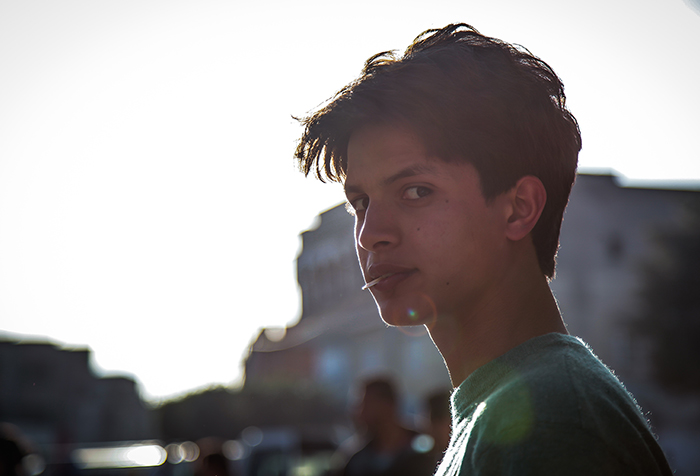
Those in deprived areas feel excluded from the democratic transition, and demands for equitable development, employment and dignity continue to be expressed in public displays of anger. Young people and women in particular feel left out of the decision-making processes. Ideological and political tensions are also increasing and continue to generate violence in Tunisia.
The political polarisation between Islamists and secularists threatens to obstruct the continuation of reforms. Many Tunisians also still deeply distrust the state, especially the judiciary and security forces.
These photographs by Callum Francis Hugh reflect the struggles of those living in deprived areas marked by poverty and high unemployment in Tunis, often described as hotbeds of radicalism after the Arab Spring.
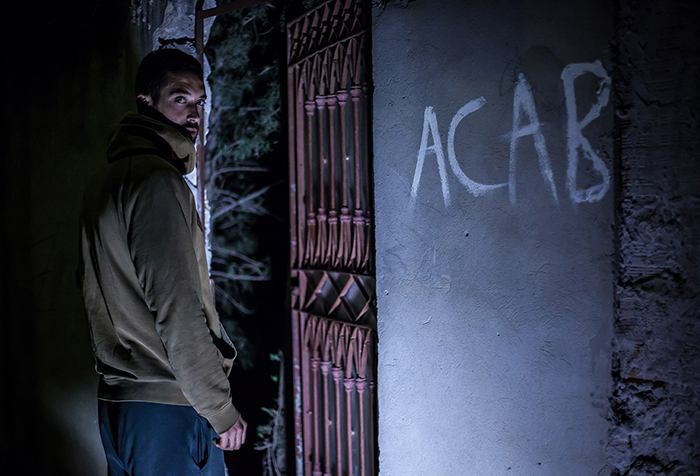
‘ACAB’ – ‘all cops are bastards’ – is graffitied on walls throughout Douar Hicher and Ettadhamen in the Tunisian capital of Tunis, providing a visceral symbol of the hatred many people feel for the police and authorities in these deprived suburbs.
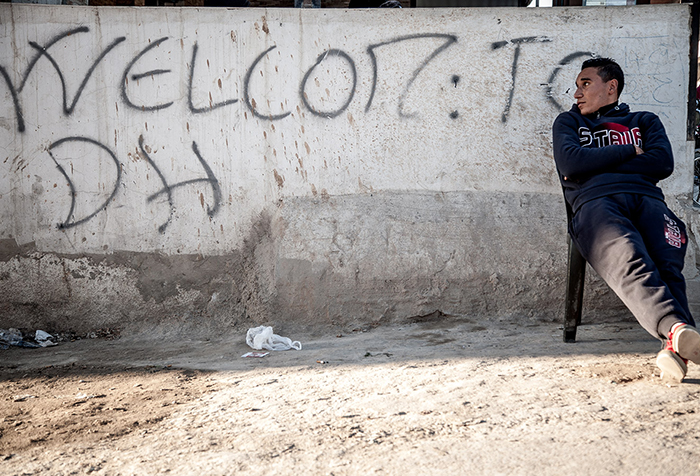
Douar Hicher and Ettadhamen are two of the most densely populated and deprived areas in Tunisia. Located less than four miles outside of Tunis, they have become synonymous with crime, violence and Islamist extremism. In recent years, they have witnessed multiple high-profile confrontations between police, religious extremists and young people.
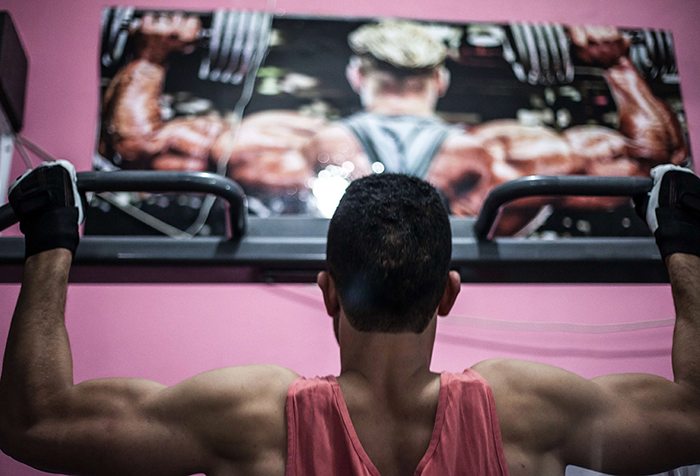
Unemployment and school exclusion in Douar Hicher and Ettadhamen are the highest in the capital. This leaves young men with huge amounts of free time, with both gyms and mosques popular forms of escape. Others turn to drugs and crime instead. Some even join Islamic State, with Tunisia being one of the largest exporters of foreign militants to Iraq and Syria.
“People are losing hope because there is no clear vision for the future,” says 31-year-old Nabil, from Douar Hicher. “The economy isn’t moving … and it was a disaster with what happened both in Bardo and now Sousse. Of course it can change, but it needs political, social and economic will. People should do their jobs properly and the reliance on corruption to get things done needs to be cut out.”
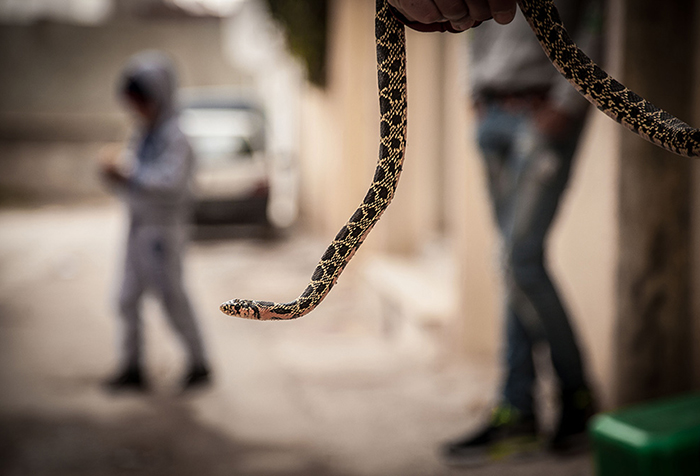
Not in school and with few constructive things to do, some children keep snakes, which they play with in the streets – a fitting symbol, perhaps, of the uncertainties and dangers they face growing up in these neighbourhoods.
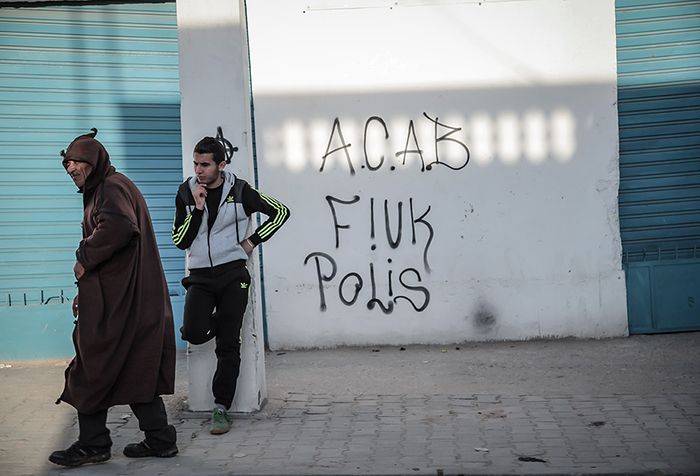
Malek, 25, from Ettadhamen: “I don’t feel safe. God knows what will happen one day to the next. You can get mugged or your face might get slit. It’s a dangerous neighbourhood. Sometimes when you go to the police to report it, it falls on deaf ears. If you’re weak here, you get eaten alive. It’s one of the main reasons violence is so prevalent. Dog eat dog. Making the country safer is a huge problem the government needs to fix.
“Not by building a wall in the south, but by building better schools and building its people to be proud again. We need to preserve the young generation and stop it from sliding into delinquency.”
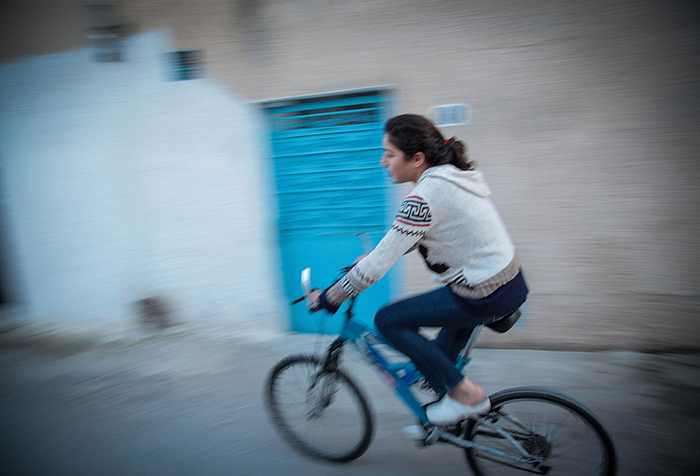
Mariam, 22, from Ettadhamen: “I’m studying law, so am often talking about where we are going as a country and what we’re doing for the future. I think we can find solutions to any problem, with more investment in the young and our education, with less bureaucracy and more inventive ways of policing our problems. We, the young, are always learning, but not always the right things.
“If you visit primary schools here, you’ll see kids at a very young age using verbal and physical violence, so unaware of the effect their surroundings are having on them. They grew up in violence. I think we should nurture kids with the importance of discussion and difference, and teach acceptance.”
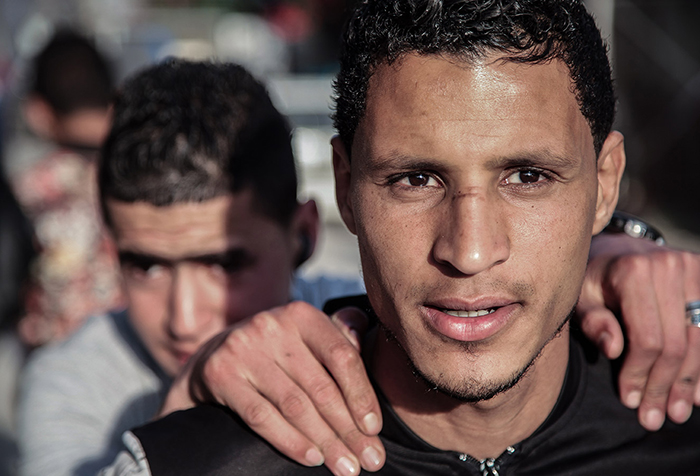
“One of the dangers is that some kids think that they don’t have to go to school because there’s no future in Tunisia – not only in Ettadhamen,” says 26-year-old Takwa.* “It’s become kind of cool not to study. If the mentality changes, this situation will change. If people start seeing that there is hope. Ambition has to change. We have to demand more from those responsible. But people need to avoid and change this violence from within, and out of awareness, not out of fear of the police.”
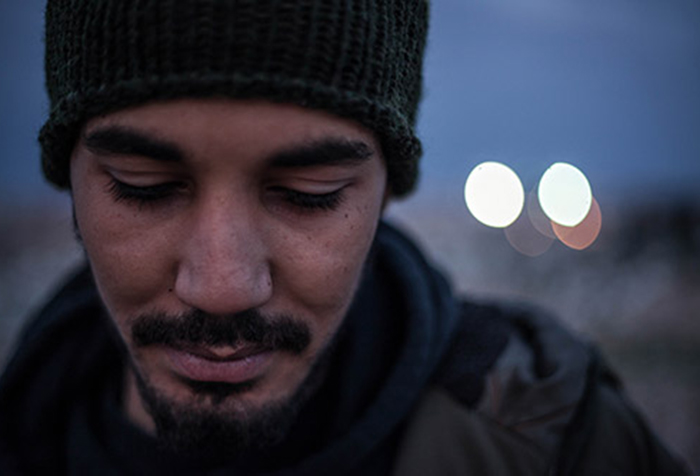
Karim, 30, from Douar Hicher: “There is violence, both verbal and physical, for girls and boys. The reasons are drugs, alcohol, bad influences, dropping out of school, the lack of mentoring. Even from religion, there’s no proper guidance. Parents are not necessarily present either, because they need to work to provide for their family, but that comes with them leaving their kids uncared for.
“We can fix this if we all cooperate. There’s some social work that needs to be done. The security system needs to be reformed. Mosques can help too, as places to meet and discuss. As well as parents obviously helping to shape a different mentality. I would love to see cultural centres too, so youngsters can go there and learn something instead of sitting in cafés all day long.”
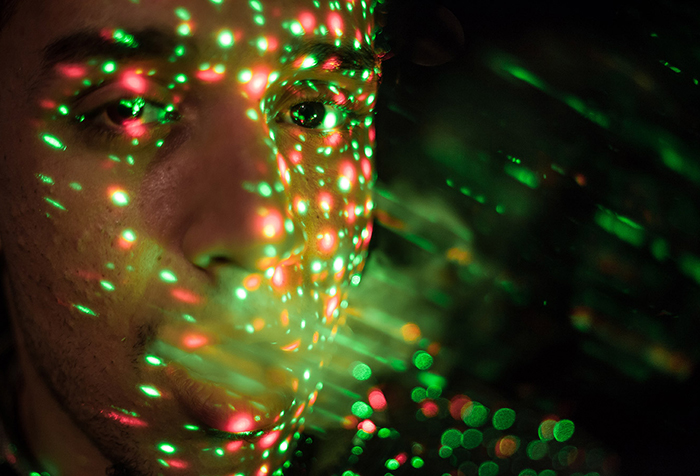
Mohamed, 26, from Ettadhamen: “Nothing’s changed since the revolution. My dad still earns the same money, my brother still has no job and the police still treat us like shit. Politicians are only in it for their positions and power. They promised us a lot of things just after the revolution that they haven’t delivered. It’s just talk to keep us all happy. I’ve never seen a politician come down here and talk to us like normal human beings. They are ferried around in black Mercedes, puffed up with their own self-importance. If we want to get rid of them and start the fire again, in a flash their time could be over. But the people are sleeping again.”
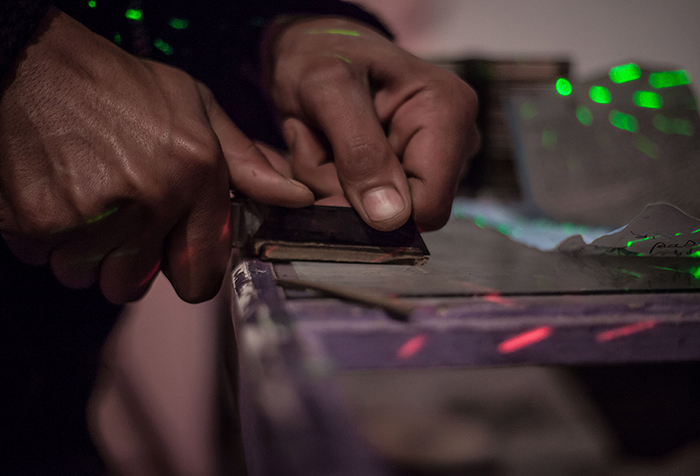
A drug dealer in his CD/DVD pirating shop serving his customers. He cuts 250 gram blocks zalta, or hashish, into ‘fingers’, sold for 10 dinars each (about £3.30). Customers risk a year in prison and fine if caught, and dealers a minimum of five years.
“This neighbourhood is known for drugs,” says 22-year old Dhia, from Douar Hicher. “You can’t escape it. People who deal and smoke take much less care these days to hide what they are doing. Despite the risks, there are kids younger than me running dealing gangs, and doing it blatantly. It makes me sad, because it’s a last form of desperation. They don’t give a damn about themselves or their future. Quick money is everything. Escapism is an underrated danger.”
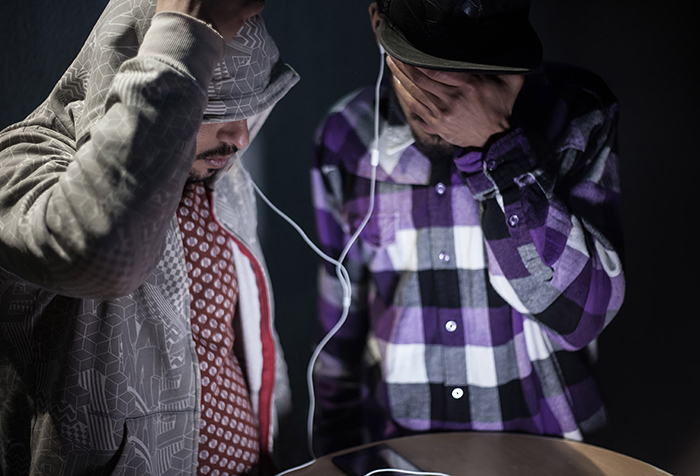
Seif, 18, from Ettadhamen (left): “Teachers don’t care if the student understands the lesson or not. They can even decide not to teach sometimes, and my mum told me this would have been impossible in her day. If they are annoyed, they just turn up to class and sit there and don’t teach. So that doesn’t exactly inspire us. We need to educate young people, to introduce them to associations and organisations that teach people to help themselves. If a young person does have enough education and awareness about certain problems, they have to share that and advise others. I want Tunisia to advance and evolve.”
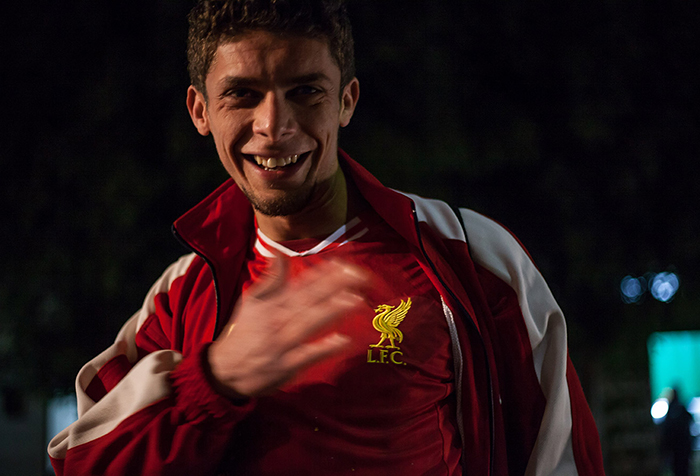
Elias, 20, from Ettadhamen: “I’ve never had problems with neighbours or guys around here. I play a lot of football, so everyone around here knows me. But there is physical and verbal abuse and violence everywhere. It’s a way of life. The reason behind it is poverty and ignorance – people let themselves go and allow their jealousy and envy to guide their way of life. One thing I’ve noticed is that people have become more aggressive since the revolution. Everything is done with a sense of righteousness: I deserve to be ahead in this queue, I deserve to be served first, I deserve to sit down first, I deserve to swear at you. It’s like the survival instinct has kicked in – be aggressive as your first position and you’re less likely to be trodden on.”
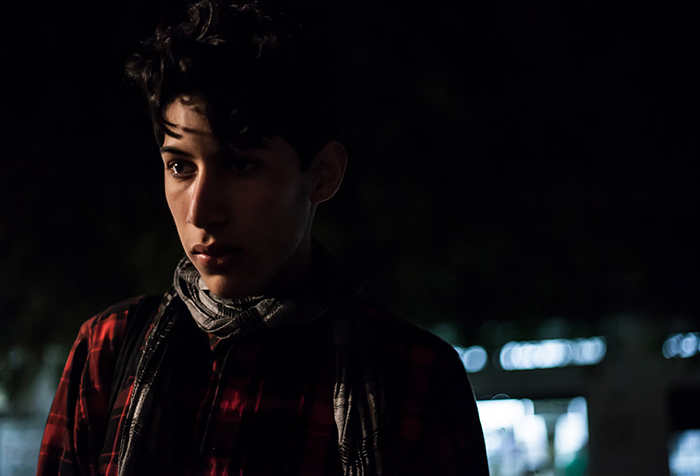
Mehdi, 19, from Ettadhamen: “After the revolution, our security decreased massively. The cops just don’t come around here, or when they do, they raid quickly and get out. Recently they have been raiding the religious groups. They are frightened of them because it seems like they are capable of anything, these groups. For me, terrorism is caused by the bad quality of education and the gullibility of young unemployed kids. The country needs to take care of its youth, because people in neighbourhoods like mine are pushed to the edge and desperate, and that leads people to do desperate things. I hope to find a job, live a comfortable life, and for this terrorism bullshit to stop!”
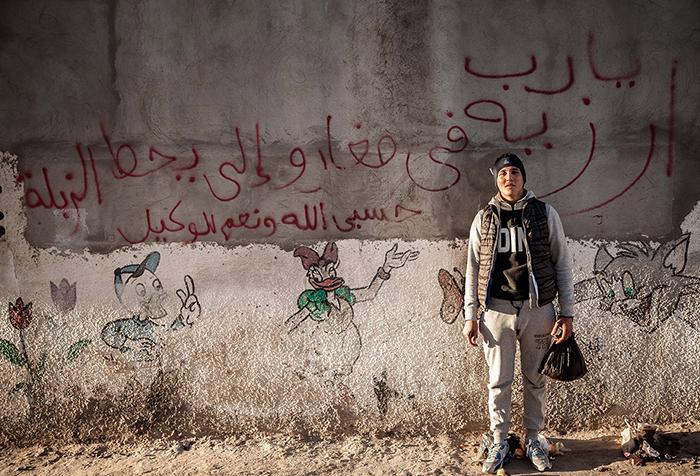
“After the revolution, things got more chaotic,” says 26-year-old Takwa* from Ettadhamen. “People misunderstand what freedom means. They think freedom means you get to be violent and ignore the law and do whatever you want. We’ve forgotten a little about how to take care of each other in all this chaos.” Here, a young person holding a bag of rubbish stands in front of graffiti on the wall of a crèche that reads, “May God severely punish the children of those that leave their rubbish here. God will pass his own judgement.”
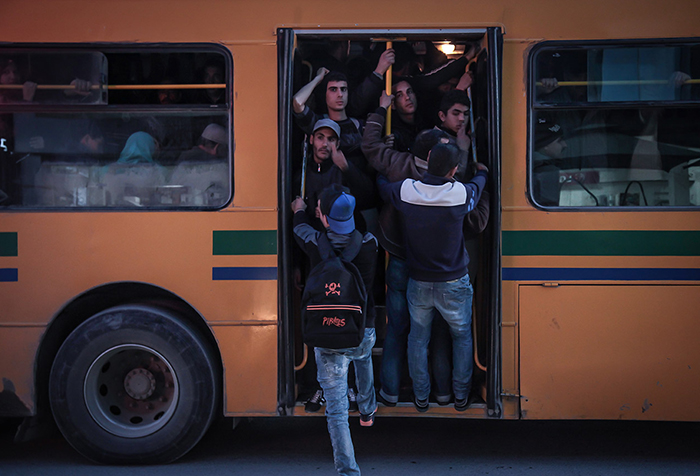
Makrem, 30, from Douar Hicher: “The biggest danger we experience here is hogra [not being treated as a social equal]. For example, in schools, they send the least competent teachers to our area. Same for the police or for employees of the public sector. If we compare the buses that come here to the buses that go elsewhere, the difference is huge. We always feel like we’re treated like second-class citizens, which has its own knock-on effects. It often brings out a strange pride in people from here to act like people expect them to act. Psychologically this issue of stigma is a complicated issue. Imagine not getting a job because of where you live or were born? Internal racism and classism are shafting us! Young people fear that this business of being ignored will go on and on.”
An abridged version of this photostory was published in The Guardian



